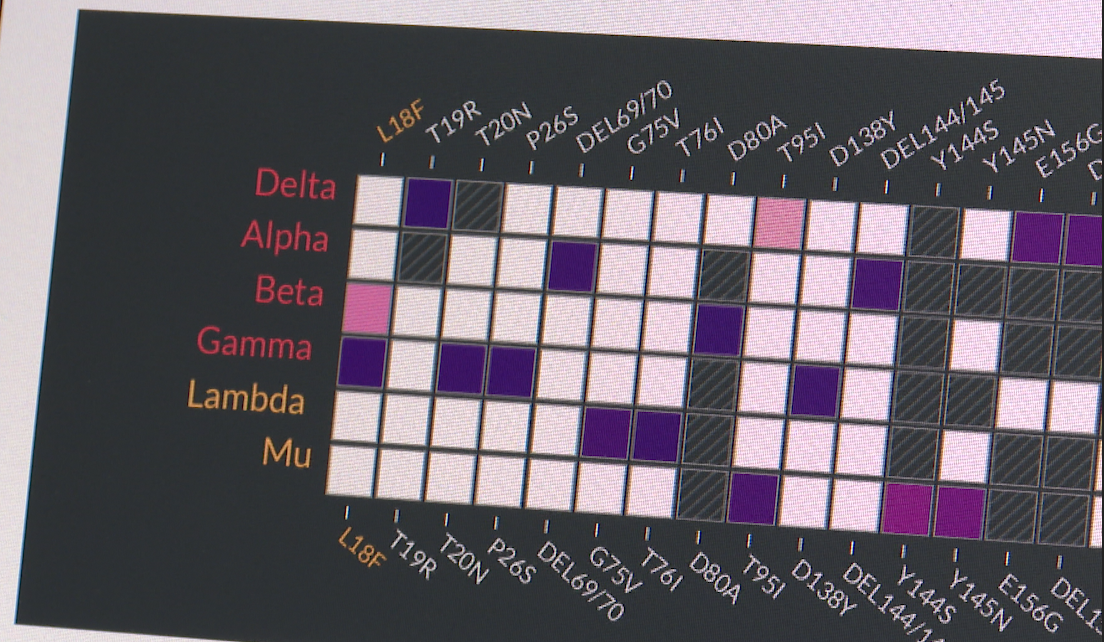Mu, a variant of the new coronavirus detected in Colombia 0:44
(CNN Spanish) -
"I believe that a common denominator of a scientist is passion," the young biologist Carlos Esteban Franco told CNN with pride.
He has been one of the Colombian scientists from the National Institute of Health (INS) who worked with very few resources to achieve a feat: to identify the mu variant of the coronavirus, which was recently recognized by the World Health Organization (WHO) for its observation and monitoring due to the high rate of infections that has occurred in Colombia and other countries.
"The work has been very hard from the beginning; it has been many hours; one ends up becoming a family of those in the laboratory," adds Franco, from one of the INS laboratories in a rare access that the CNN en Español team had where This team of scientists does their hard and passionate work.
The days in the laboratory have been long.
Several of the 15 Colombian scientists who were able to identify the mu variant have had 36 hours and up to 72 hours of work to understand the behavior of this variable.
The mu variant "is not cause for alarm" at present, as the delta continues to dominate, according to Fauci
Colombian scientists identified the mu variant of coronavirus in long hours of work with limited resources.
(Credit: Fernando Ramos / CNNEE)
“There is information and genomic evidence that the virus has changed in some specific parts.
And there is information from the laboratory and genealogical studies that assign characteristics such as greater transmissibility or an ability to evade the immune system to a certain degree, "Franco said during a CNN visit to the INS laboratories.
advertising
An investigation with few resources
Although this type of scientific work may sound like a normal process in the midst of a global pandemic, the truth is that the team of Colombian scientists has had to face several challenges, including a lack of resources.
First, the SARS-CoV-2 samples for analysis and processing arrive, mostly, from remote parts of Colombia and also from the most populated areas and capital cities.
But time is a determining factor for successful genomic surveillance.
The team also has another difficulty: they do not have the high-tech equipment of developed countries such as the United States or Europe, but they say they are proud of what they have achieved in this time.
In addition to the recognition of their colleagues around the world for the results of their work, they say that the most important thing is knowing that what they do can help save lives.
“The developed countries pooled all the resources for their development and their own research.
Then we were overwhelmed in the purchase of reagents to be able to work, ”said Marcela Mercado Reyes, director of research and public health at the INS.
Scientists identify two new variants: C.1.2 and mu;
What data do we have about them?
Dr. Huerta explains to us
(Credit: Fernando Ramos / CNNEE)
Mu, a variant of global concern
This team of scientists from the National Institute of Health (INS) managed to identify the presence in Colombia of the mu variant of SARS-CoV-2 by working tirelessly in an unequal battle that has claimed the lives of at least 125,000 people since 6 March 2020, when the first case of the pandemic in the country was reported.
Some of these experts have been at the Institute for more than 20 years, fighting diseases such as malaria, Zika, chikungunya, salmonella and cholera, among many others that are registered in Colombia and that have also caused thousands of deaths and effects on the health of its inhabitants.
But young scientists who are under 30 years old and who are passionately dedicated to researching the genomes of the new coronavirus and its mutations are also part of the group, such as the biologist and researcher Franco, who speaks with pride of his work.
The variant is a concern for the scientific community.
In particular because studies show that it was responsible for about 60% of the third peak of the pandemic that Colombia just managed to overcome and that caused the death of thousands of people and the contagion of a high percentage of the population.
The fear is that the mu variant could spread rapidly to other countries in the region.
But so far, according to experts in public health and infectious diseases, such as Dr. Anthony Fauci, in the US, this variant is not a cause for alert "so far", since the delta continues to dominate.
"The reason it was drawn to attention is that it had a number of mutations that were of interest. But when you look at the effect of antibodies against these mutations, it is not cause for alarm, in the sense that, although it decreases a little protection falls within the range of delta and beta, "Fauci said in a briefing by the White House covid-19 response team.
In the US, the mu variant has been identified in 0.5% of cases, according to Fauci.
But returned to Colombia, this group of scientists and experts continue with extreme vigilance on the behavior of the virus in the country, especially the mu variant, to minimize the impact on a probable fourth peak of the pandemic starting in October as the Colombian Ministry of Health has warned.
Covid-19 mu variant

